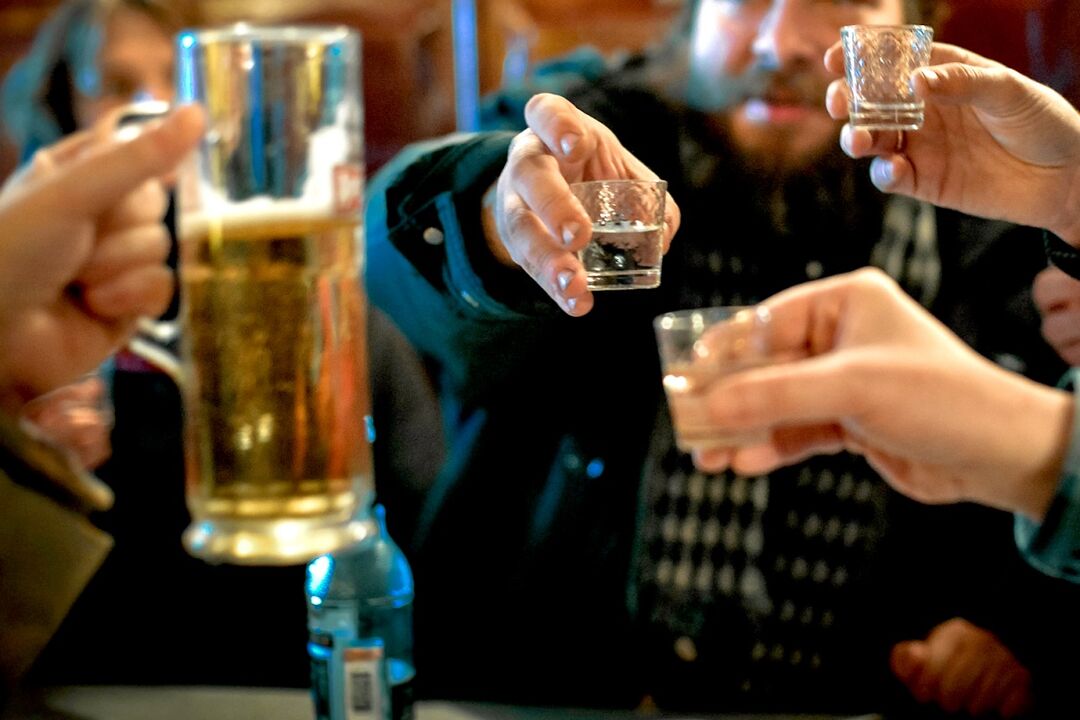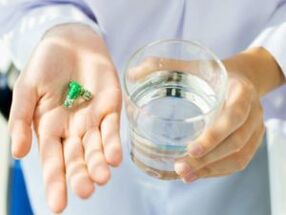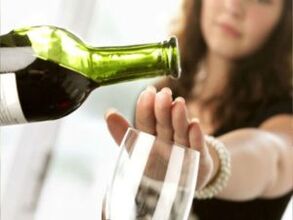
Alcohol generally has a strong negative effect on the body. If you use it immediately after stopping taking antibiotics, then the risk of the problem increases significantly. Of course, in some cases the danger will be minimal, but many drugs that are usually prescribed for serious diseases are categorically incompatible with alcohol.
During antibiotic therapy, doctors recommend abstaining from alcohol. Similar limitations are described in the instructions for use of each antimicrobial agent. If you drink alcohol after antibiotics, the effect of therapy may be weakened or minimized. Perhaps the development of side effects and complications.
How long does it cost to wait after antibiotic treatment before drinking wine, vodka or even beer? Read more about this.
Antibiotic - what is this medicine
There are several major types of antibiotics. The simplest ones are made from organic raw materials, the others are purely synthetic, and the third ones are a kind of intermediate variant. Regardless of the group, all drugs help to slow down the development of pathogenic microflora, suppress it and destroy it.
The drugs in question can only be used for infections of a bacterial nature - they do not affect viruses at all (not even the flu).
Antibiotics are available in different forms:
- capsules;
- pills;
- fats;
- Injection fluids;
- syrups.
Regardless, the drugs work the same way. Moreover, even when it comes to external means, the main substance still penetrates the blood.
Can I drink alcohol after completing a course of antibiotics?
When a person becomes ill, the main task of the doctor is to ensure his quick recovery. For this purpose, in addition to drugs, you can prescribe:
- a child;
- physiotherapy;
- various additional procedures.
At the same time, the doctor is obliged to minimize the effect of all negative factors that could potentially delay treatment, reduce its effectiveness or cause complications. To this end, experts recommend abstaining from drinking alcohol.
Each disease in itself is a great burden on the immune system. Moreover, many antibacterial drugs do not work very well on the internal organs. For this reason, their dose and duration of administration are determined as accurately as possible. Alcohol, taken orally, adversely affects the liver and kidneys, even in a completely healthy person. Accordingly, in combination with a pathogenic agent and antibiotics, it extremely overloads the mentioned organs and increases intoxication.
Even when the course is over, it is not worth rushing to catch up - doctors advise you to wait a certain time. So, in case of acceptance:
- it is allowed to take conventional antibiotics after at least 3 days (preferably 5);
- long-acting drugs - it is necessary to wait at least 3 weeks.
Which antibiotics cannot be combined with alcohol
There are many types of drugs, in the process of taking which it is absolutely impossible to drink alcohol.
Thus, nitroimidazoles are incompatible with alcohol. Their combination with ethanol causes a disulfiram-like reaction, an acute intoxication used to encode people who want to stop drinking.
In this situation, it is better to start drinking alcohol at least two days after the end of the course.
The next group are fluoroquinolones. Here alcohol is allowed after 3 days. Medications already have a huge effect on the central nervous system, and together with alcohol, they can lead to the development of severe side effects (the worst of which is coma).
People who take cephalosporins should give up alcohol during the cycle. It is necessary to wait at least a day after its completion. If there is any renal pathology, then he will be able to relax not earlier than after 3 days.
Taking tetracycline is very painful for the liver. These drugs are excreted from the body for a long time. It is better to postpone drinking alcohol for 4 days.
Aminoglycosides are another rather toxic group of antibiotics. They also damage the kidneys and liver. After treatment with these drugs, you should not drink alcohol for about 15 days.
Lincosamides (even when taken by a system developed by a doctor) have a negative effect on the liver and central nervous system. May produce a disulfiram-like reaction. Drink alcohol no earlier than 4 days.
All macrolides increase the risk of developing liver cirrhosis. They are poorly excreted from the body. How long do you have to wait? The recommended period of abstinence is 5 days.
Antibiotics that help fight tuberculosis are usually taken for a long time. They have a side effect - drug-induced reactive hepatitis. When it comes to such drugs, alcohol is drunk exclusively by suicide bombers.
How long can the antibiotic last after completing the course
Scientists have determined how much specific metabolites of antibiotics preserve activity in the body. If we are talking about simple medicines, then the period is 3 days. In case of extended - from 2 or more weeks.
The duration of abstinence from alcohol is influenced by numerous other factors:
- course duration;
- drug compatibility with ethanol;
- the presence of direct contraindications.
It is impossible to determine for yourself how long to wait before consuming alcohol. For that reason, it is better to get a comprehensive consultation with a doctor.
What happens if you take an antibiotic with alcohol

Alcohol in the process of taking antibiotics can cause many unwanted complications. First of all, ethanol is guaranteed to weaken the effectiveness of the drug, leading to the development of resistance in the pathogenic strain.
It is impossible not to mention the possibility of the disease turning into a chronic form. Even due to the small amount of alcohol, the antibiotic is absorbed faster and does not reach the infected area.
Alcohol with the drug in question often causes blood clots, and this, in turn, is fraught with heart attacks or strokes. At best, existing diseases of the cardiovascular system will worsen.
When alcohol is consumed, the concentration of antibiotics decreases. Doctors must increase the dose of the latter, which increases the burden on the kidneys and liver. We must not forget the negative effect of ethanol itself on these organs.
There is also an additional risk of allergies. In simple cases, the patient will get a rash and itching, and in complex cases, Quincke's edema or even anaphylactic shock may develop.
When you can drink alcohol immediately after antibiotics
There are several drugs that are allowed to use ethanol. The above cannot be considered permission to drink tablets directly with alcohol. It is necessary to wait at least 3-6 hours, but it would be more correct to give up the idea of breastfeeding until the treatment is over.
These relatively safe drugs include:
- penicillin and its derivatives;
- a number of glycopeptides;
- ansamycins and others.
Keep in mind, if you have to take any of the above antibiotics, do not forget about the likelihood of an individual reaction to their combination with alcohol.
Admission rules
Antibiotics must be taken properly - only then will they have the appropriate effect. So, in particular:
- the medicine is prescribed exclusively by a doctor;
- it also determines how much to consume and in what doses;
- the drug is washed off with cold and unsweetened drinks (preferably water);
- diet should be followed during treatment (fats are prohibited, emphasis on protein foods and long carbohydrates);
- while taking an antibiotic, drink plenty of water;
- even if the symptoms disappear, continue treatment for a period determined by your doctor.
Can I drink alcohol while taking antibiotics?
As practice shows, many people do not know whether it is allowed to combine alcohol and antibiotics. Some are sure that consuming alcohol is not dangerous if you do it a few hours after taking the medicine. Others are convinced that they should not be confused under any circumstances. In reality, the truth is somewhere in the middle - it all depends on the general condition of the patient and the type of medication being prescribed to him. What effect does alcohol have on the body if you drink it together with antibiotics? We'll talk more about that.
How strong alcohol reacts with antibiotics
Only a naive person will ask doctors which antibiotics can be combined with alcohol. He will certainly say that their parallel leadership is definitely a big mistake. In fact, they are right, because for them the main task is to get a person back on their feet as soon as possible.

Why can't you take antibiotics and alcohol at the same time? Doctors note that after taking (only oral) antibacterial drugs, their breakdown products are used by the liver. This organ is generally the main filter that removes toxins, ie cleanses the blood of substances that got there due to alcohol consumption. If you mix alcohol and drugs, then the load increases by about half - this leads to accelerated depletion of the liver.
In addition, when taking antibiotics, be sure to drink plenty of water, which allows you to speed up the process of their withdrawal. The same goes for treating alcohol poisoning. Excess moisture increases the load on the kidneys, which is also not good.
At the same time, alcohol in a certain way changes the intensity and quality of metabolism. It is impossible to predict what its impact will be here. If a person mixes drugs and ethanol, then as a result, the former may act either too weak or too strong.
At the same time, there are antibiotics that, once in the human body, bind to alcohol, which leads to a greater negative impact on the central nervous system and gastrointestinal tract.
So, if you are drinking the drugs in question, then it is worth finding out how they work with strong alcohol and whether it is in principle permissible to combine them.
Why you should not drink alcohol
If everything is more or less clear with strong alcohol, then there are certain difficulties with weak alcohol. Many patients are sure that you can drink the latter even while taking antibiotics, believing that the strength of the negative impact depends solely on the strength of the alcohol.
In fact, this is a fallacy. Both vodka and wine contain ethyl alcohol, which in both cases works in the same way. Moreover, the amount of light alcohol consumed is usually higher than in the case of strong alcohol, ie as a result we all get an increase in the load on the liver and kidneys.
The combination of weak alcohol with antibiotics is dangerous for others, because such alcohol contains many additional ingredients:
- yeast residues;
- colors;
- sweeteners;
- aromatic compounds;
- preservatives;
- carbon dioxide, etc.
All of these substances increase the risk of side effects.
Taking antibiotics with alcohol - likely consequences
The main consequence that threatens people who drink both antibiotics and alcohol is intoxication. The severity of the latter may be different. In general, healthy people often have mild symptoms, while chronic patients often have the opposite. In all cases, the poisoning was monitored:
- nausea;
- dizziness;
- loss of coordination;
- vomiting;
- diarrhea
- migraine;
- hyperthermia;
- convulsions;
- unconsciousness.
In difficult situations, the person is urgently hospitalized.
It will definitely not be possible to avoid unpleasant consequences in combination with alcohol:
- Tetracyclines and almost all drugs in this series;
- Cephalosporins;
- Nitroimidazoles.
These antibiotics quite actively interact with ethanol, even if they are not mixed, but are taken with a break of 6 or 8 hours. As a result, a reaction called disulfiram begins in the body. Simply put, there are signs of severe intoxication.
In normal cases, this effect helps people who stop drinking, but here the process is controlled by narcologists, and if the health condition worsens excessively, the patient is immediately stabilized with medication. It is impossible to provide adequate help at home - so alcohol should not be mixed with these drugs.
These drugs cannot be combined with other chemicals at all. It is not recommended to mix ethanol with antibacterial drugs that help against tuberculosis and leprosy.
Never drink alcohol if your doctor has prescribed sulfonamides.
Antibiotics conditionally compatible with alcohol

What drugs can be combined with alcoholic beverages? It all depends on their inherent pharmacodynamics.
An important factor here is the half-life of the drug and the length of stay of its metabolites in the body. If these indicators do not change significantly when you drink alcohol, then you can take antibiotics and not deny yourself alcohol.
Drink ethanol in small amounts without fear when it comes to penicillin-related medications.
How much is allowed to drink? If we are talking about vodka, then the dose is about 50 ml. Dry wine is allowed a maximum of 150 ml, and dessert - 100.
Types of antibiotics that do not mix with alcohol are shown in the table:
> zxtable border = "1" cellpadding = "0" >The effects listed in the table often occur during long-term drug treatment, even in people who do not drink alcohol at all. Moreover, when there are no negative manifestations (for healthy people this is generally normal), then taking any of these antibiotics is not a contraindication. At the same time, it is worth remembering that it is better not to mix the drugs listed in the table with alcohol if you want to recover faster.
After how many days it is allowed to drink alcohol without special restrictions
So, you stopped taking the antibiotic and asked yourself: after what period of time is it allowed to drink without fear? The primary elimination of most drugs was completed after one day (18-24 hours). When this period is over, in principle, it is not dangerous to take a little on the chest. Antibiotics are completely eliminated from the body after 14 days. That is, in the absence of other contraindications, after 2 weeks it is possible to try to make up for the delay.
Another question is also important: how long should I abstain before taking antibacterial drugs? When thinking about non-acute illness, it is better to wait 4 days, in emergencies a day is enough.
In the case of tetracycline antibiotics, the patient must wait at least 72 hours.































